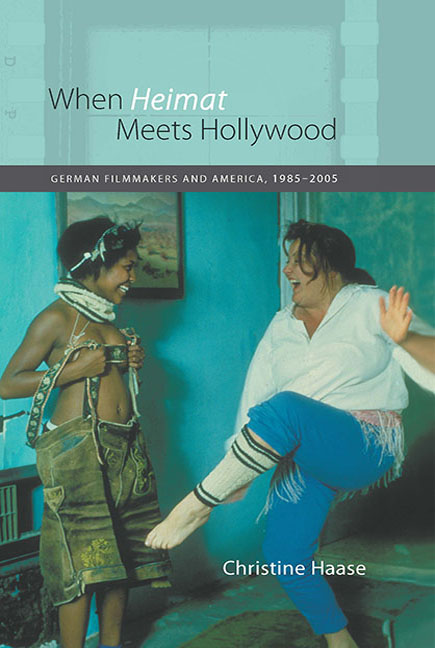Book contents
- Frontmatter
- Dedication
- Contents
- Acknowledgments
- Introduction
- 1 German and American Film Relations in the Twentieth Century
- 2 Wolfgang Petersen: Blockbuster Auteur?
- 3 “Foil, Toothpaste, ID4”: Ideology and Global Appeal in the Films of Roland Emmerich
- 4 Crossing Boundaries, Connecting People: The German-American Films of Percy Adlon
- 5 “Bambi, Zombie, Gandhi”: The Cinema of Tom Tykwer
- Conclusion
- Works Cited
- Index
Conclusion
Published online by Cambridge University Press: 11 May 2017
- Frontmatter
- Dedication
- Contents
- Acknowledgments
- Introduction
- 1 German and American Film Relations in the Twentieth Century
- 2 Wolfgang Petersen: Blockbuster Auteur?
- 3 “Foil, Toothpaste, ID4”: Ideology and Global Appeal in the Films of Roland Emmerich
- 4 Crossing Boundaries, Connecting People: The German-American Films of Percy Adlon
- 5 “Bambi, Zombie, Gandhi”: The Cinema of Tom Tykwer
- Conclusion
- Works Cited
- Index
Summary
German films exist in a sphere of two overlapping force fields: on the one hand, they are commonly made, defined, and read as part of a national cinema; on the other hand, they increasingly transgress national boundaries due to intensifying globalization and dissolving cultural and economic borders. The sea changes associated with the revolution in Information Technology and the fast flow of capital and culture between nations and through cyberspace require us to reassess our ideas of the local and the global. This deterritorialization and dislocation brought on by globalization and the accompanying internationalization of the movie industry create considerable challenges for the analysis of film from a vantage point of national cinema, for many decades one of film studies’ master paradigms. This study has been specifically interested to advance the understanding of German cinema, given the increasing internationalism of the country's film industry and its extensive and longstanding ties to U.S. filmmaking, by investigating the relationships of four contemporary German directors with Hollywood and the United States. Two main questions have been at the heart of this investigation: how do these German-born directors negotiate the competing territories of national and transnational cinema?; and how do these productions engage with (or dis-avow) national-cultural identities? This study has addressed these questions by analyzing the stylistics, aesthetics, and politics of the cinematic practices of Wolfgang Petersen, Roland Emmerich, Percy Adlon, and Tom Tykwer as they emerge in films whose production is substantially linked to Hollywood and the United States or which are strongly influenced by Hollywood paradigms, while at the same time situating these practices within the relationship between German and American film. By combining an overview of the career trajectories of the four directors with close readings of their key works, the four chapters have charted the distinct directorial signature of each, relating them to each other and to the different national cinematic paradigms they draw on. These close readings have isolated the stylistic, ideological, and economic differences between the cinematic projects of the four filmmakers, delineating four distinct approaches to transnational film production.
- Type
- Chapter
- Information
- When Heimat Meets HollywoodGerman Filmmakers and America, 1985–2005, pp. 197 - 204Publisher: Boydell & BrewerPrint publication year: 2007



